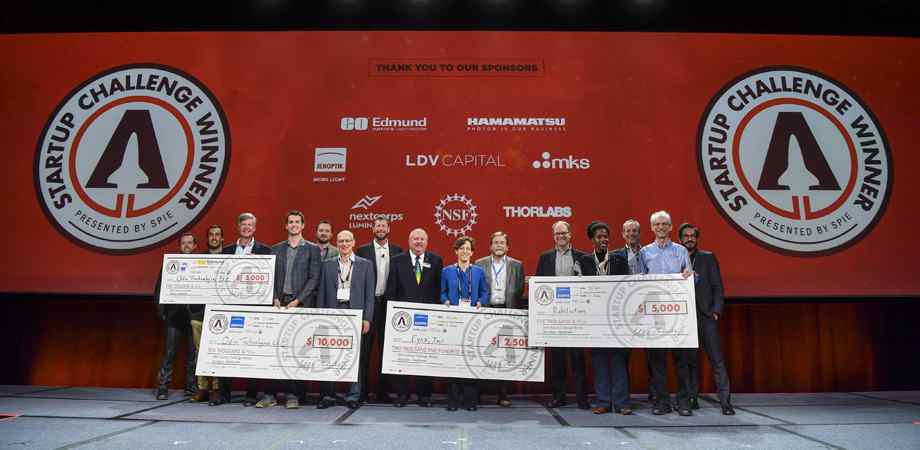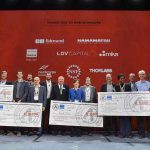Wearable Diagnostics, Spectroscopic Systems Win Big at SPIE Photonics Startup Challenge

On 5 February, six startups won industry accolades as well as sharing more than $85,000 in cash and business support at the 10th annual Startup Challenge at SPIE Photonics West.
For the first time, the pitch competition included two distinct tracks: Healthcare and Deep Tech, a clear indication of the exciting growth, trajectory, and popularity of the Challenge.
In the Deep Tech track, Senorics, which builds low-cost, mobile spectroscopic systems that detect contaminants in food – “With our technology, Snow White would never have eaten that apple” – won first place; Labby, a data company combining optical sensing with AI for real-time milk analysis, came in second; and Circle Optics landed third with its 360-degree Hydra camera.
In Healthcare, Odin Technologies was the top winner with a wearable, disposable technology that measures perfusion in order to identify non-obvious hemorrhages and compartment syndrome in trauma patients, while Rubitection won second place with its Rubitect Assessment System, an optical monitoring tool for preventing bedsores. Eysz, Inc., whose software algorithm uses oculometric data – eye movements – to detect and respond to epilepsy seizures, was honored with third place.
Odin and Senorics took home checks for $10,000 from Jenoptik, plus $5,000 in equipment from Edmund Optics, a Challenge co-sponsor; Labby and Rubitection received $5,000; and Circle Optics and Eysz took home $2,500. The Startup Challenge runs alongside the SPIE Venture Summit as a part of a week-long entrepreneur program, so Challenge semi-finalists and finalists have multiple opportunities for mentorship, industry advice, and feedback as they hone their final pitches.
“For me this is an incredible experience because I’m taking part in this competition for the third time,” said Senorics CEO Ronny Timmreck. “We’ve been really persistent and have worked hard on our business model and on the technology, so I’m very proud that we are the winners this year. The support and feedback we get here is great. I want to tell all the founders and other companies: you get much more than just the prize at the SPIE Startup Challenge. I like the prize, but the most valuable thing at this competition is that you get the support, the mentors, and feedback on your pitch and business model.”
“I loved all of it,” said Odin CEO Steven Hansen. “Between Farzin [Samadani] and Viktor [Brandtneris] as the onsite presence of National Science Foundation’s I-Corps – the experience they offer is phenomenal; they have great gold nuggets of information that they can apply to us. The whole week extended beyond the Startup Challenge: it was going around the exhibition floor, it was talking to mentors and advisors and technologists, learning how to interface with these people and what kinds of questions to ask. The Challenge from start to finish is a great program and a terrific opportunity. Being able to learn from the experts here is invaluable.”
The SPIE Startup Challenge, which showcases new businesses, products, and technologies that are addressing critical needs with photonics, is enabled by Founding Partner Jenoptik; Strategic Partner LDV Capital; Lead Sponsors Edmund Optics, MKS Instruments, Hamamatsu, Thorlabs, and B&W Tek CEO Sean Wang; and Supporting Sponsors the National Science Foundation and the Luminate Accelerator.
Judges drawn from across the industry who vetted the applicants for their business models, financial cases, and competitive advantages included Sony Venture’s Shoichi Osawa, Maschmeyer Group Ventures’ Lauren Pfeifer, Fusion Fund’s Homan Yuen, Photon Fund’s Zhenlin Li, LDV Capital’s Evan Nisselson, Genoa Venture’s William Hyun; LightWave Advisors’ John Dexheimer and Mark Wippich, SANICA Ventures’ Don Golini, NewCap Partners’ Christopher Rowan and Danny Piper, Renovo Capital’s Jerry Panagrossi, Anzu Partners’ Jimmy Kan, Johnson & Johnson Innovations’ Andrew Pilon, Phoenix Venture Partners’ Frank Levinson, True Wealth Ventures’ Kerry Rupp, and Hamamatsu Photonics’ Darren Martindill.
About SPIE
SPIE is the international society for optics and photonics, an educational not-for-profit organization founded in 1955 to advance light-based science, engineering, and technology. The Society serves more than 255,000 constituents from 183 countries, offering conferences and their published proceedings, continuing education, books, journals, and the SPIE Digital Library. In 2019, SPIE provided more than $5 million in community support including scholarships and awards, outreach and advocacy programs, travel grants, public policy, and educational resources. www.spie.org




